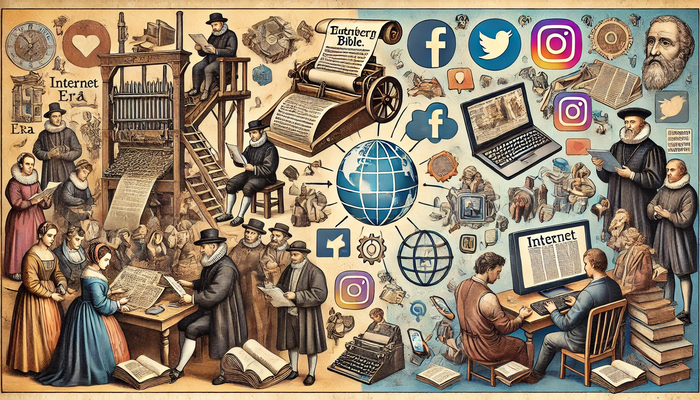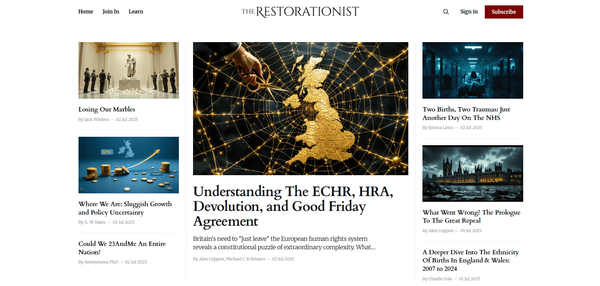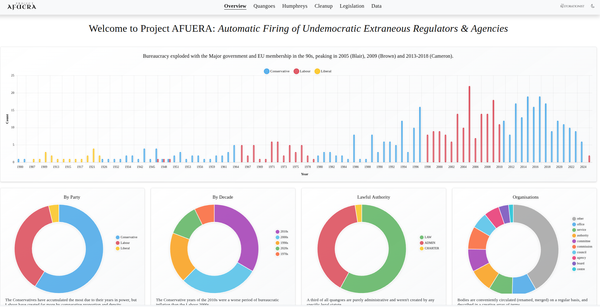The Internet Era Is A Repeat Of The Printing Press & The Reformation

They call it "Our Democracy" vs "Populism". We are in a titanic Reformation-esque power struggle between old-world Representative Democracy and the emerging new world of technological Direct Democracy, driven by the Internet. Our representatives and the institutions are desperately trying to cling on to power as an incumbent aristocracy, and they cannot win.
The parallels between the invention of the Printing Press and the Internet are striking. Both technologies revolutionized the way information is disseminated and consumed, leading to significant social, political, and cultural upheavals. The problems between Parliament and the people are in direct parallel to the Chartists of the 19th Century.
Information And Communication = Revolution
When the printing press emerged, it democratised access to knowledge, allowing for rapid and widespread distribution of ideas. This threatened the monopoly on information held by religious and political authorities. Similarly, the Internet has enabled unprecedented access to information and platforms for expression, disrupting traditional gatekeepers of knowledge and communication.
In response to the printing press, authorities implemented various forms of censorship and control. Books were banned, printers were regulated, and authors faced persecution. Today, we see analogous measures applied to the Internet, with website blocking, content filtering, and legal actions against online platforms and users.
Both eras witnessed the criminalisation of certain types of speech and the implementation of surveillance measures. In the age of print, informants would report on subversive publications (samizdat), while today, digital surveillance tools monitor online activities.
The justifications for suppression in both periods often invoke concerns about social stability, moral corruption, and national security. However, these arguments frequently mask the underlying desire to maintain control over the flow of information and preserve existing aristocracies.
Despite attempts at suppression, both technologies ultimately led to profound social, political, and cultural changes. The printing press facilitated the spread of Renaissance ideas and the Protestant Reformation, while the Internet has enabled global connectivity and new forms of social organisation.
Everyone can vote in a Twitter poll from their smartphone. And do their own research. Why not on laws?
We've Been Here Before
If you don't know about the Printing Press, and the century of turmoil humans writing down their ideas caused, it's quite fascinating.
Does any of this sound familiar or resonate with the time we are in now?
- 1440s: Johannes Gutenberg develops the printing press in Mainz, Germany;
- 1476: William Caxton introduces the printing press to England;
- 1501: Pope Alexander VI issues a bull against the unlicensed printing of books;
- 1534: King Henry VIII breaks with the Catholic Church and establishes the Church of England;
- 1535: Henry VIII issues a proclamation prohibiting the publication of books without royal permission;
- 1536: The Treasons Act 1536 (also known as the "treason by words" law) is passed in England, making it high treason to speak rebellious words against the King;
- 1538: Henry VIII issues a proclamation banning the importation of foreign publications;
- 1543: The Act for the Advancement of True Religion is passed, restricting the reading of the Bible in English to the upper classes;
- 1546: The Council of Trent establishes the Index Librorum Prohibitorum, a list of prohibited books;
- 1557: The Stationers' Company is granted a royal charter in England, giving it a monopoly on printing and the power to censor publications;
- 1559: Queen Elizabeth I issues the Injunctions of 1559, requiring all books to be licensed by the Queen or six Privy Councillors;
- 1586: The Star Chamber Decree concerning Printers is issued, further tightening controls on the printing press in England.
What Were Its Effects?
Knowledge spread further and faster
The printing press allowed for the mass production of books, pamphlets, and other written materials, making knowledge more accessible to a wider audience. This contributed to increased literacy rates and the democratization of learning.
- The mass production of books and other printed materials made knowledge more accessible, contributing to increased literacy rates across Europe.
- Literature became more accessible to the general population. Examples include the works of Shakespeare in English and Dante's "Divine Comedy" in Italian.
- Books became more affordable and widely available, allowing a broader range of people to access education and knowledge. This led to the growth of universities and the spread of humanism.
- It facilitated the exchange of ideas among scholars across Europe, creating a network known as the "Republic of Letters." Scholars like Erasmus and Voltaire corresponded and shared their works through printed letters and books.
- Agricultural techniques, medical treatments, and geographical discoveries spread widely. For example, the works of Vesalius in anatomy and the accounts of explorers like Marco Polo and Christopher Columbus were widely published.
- It contributed to the emergence of a public sphere, where ideas could be debated and discussed by a wider audience. Coffeehouses and salons became centers of intellectual exchange, fueled by the availability of printed materials.
Religion went into chaos
The printing press played a crucial role in the Protestant Reformation. Reformist ideas spread rapidly thanks to printed materials, challenging the authority of the Catholic Church and leading to significant religious and political conflicts.
- Martin Luther's 95 Theses, printed and widely distributed, sparked the Protestant Reformation, challenging the authority of the Catholic Church.
- The works of other reformers, such as John Calvin and Huldrych Zwingli, were printed and disseminated, contributing to the growth of Protestantism.
- The spread of Protestant ideas led to religious wars, such as the French Wars of Religion and the Thirty Years' War.
Dissenting movements grew
The ability to mass-produce and distribute printed materials enabled the spread of political ideas that challenged the status quo. Dissenting opinions and criticisms of those in power could now reach a broader audience, fueling political unrest and even revolutions.
- Pamphlets like Thomas Paine's "Common Sense" helped spread revolutionary ideas and galvanize support for the War of American Independence.
- The works of Enlightenment thinkers, such as Voltaire and Rousseau, circulated in print and influenced the ideals of the French Revolution.
- The printing press enabled the spread of political ideas and the formation of political parties, such as the Federalists and Anti-Federalists in the United States.
Aristocracies responded with censorship
The political class, particularly monarchs and the Church, reacted to the challenges posed by the printing press by attempting to control and censor printed materials. Licensing systems, censorship boards, and the Index Librorum Prohibitorum (a list of banned books) were established to restrict the spread of ideas deemed subversive or heretical.
- The Catholic Church maintained a list of prohibited books, attempting to control the spread of ideas deemed heretical.
- In England, a guild was granted a monopoly on printing and the power to censor publications.
- The Star Chamber Decree tightened controls on the printing press in England, requiring all books to be licensed by the government.
Nationalism exploded
The printing press enabled the standardization and spread of vernacular languages, contributing to the rise of national identities. This laid the foundation for the development of nation-states and nationalist movements.
- Vernacular languages, such as English, French, and German, contributed to the development of national identities.
- The publication of works like the "Nibelungenlied" in Germany and "Le Chanson de Roland" in France helped foster a sense of national pride and unity.
- The printing press enabled the spread of nationalist ideas, contributing to the rise of nationalist movements in the 19th century, such as the unification of Germany and Italy.
The Scientific Enlightenment Emerged
The printing press facilitated the exchange of scientific ideas and discoveries, accelerating the Scientific Revolution. Scholars could now build upon each other's work more easily, leading to rapid advancements in various fields.
- The printing press facilitated the exchange of scientific ideas and discoveries, leading to advancements in fields such as astronomy, physics, and medicine.
- The publication of Copernicus' "De revolutionibus orbium coelestium" and Galileo's "Sidereus Nuncius" challenged the prevailing geocentric model of the universe.
- The Encyclopédie, edited by Denis Diderot and Jean le Rond d'Alembert, aimed to systematize and disseminate knowledge during the Enlightenment.
Are Direct Democracy & Populism The Same?
We first need to look at what we have now. Representative democracy, the incumbent framework, and direct democracy, what we are moving towards, are two different systems of democratic governance.
Representative versions such the UK and Germany:
- Citizens elect representatives to make decisions on their behalf;
- Elected officials pass laws and make policy choices;
- Allows for governance of large populations and complex issues;
Edmund Burke argued that elected representatives should be individuals of superior judgment and expertise. He believed they should use their wisdom to make decisions in the best interest of the nation, rather than simply following the momentary passions of the electorate. Representatives should prioritise the broader national interest over the narrow concerns of their local constituents, would lead to more stable and consistent governance, and could act as a check against the potential tyranny of the majority, protecting minority rights and interests. He famously told the electors of Bristol that he was their representative, not their delegate.
Direct versions like Athens and Switzerland:
- Citizens vote directly on laws and policies;
- No elected representatives making decisions;
- Works best for smaller populations or local issues;
George Gallup, the American pollster, argued modern communication technologies make direct democracy more practical, and believed average citizens were capable of making informed decisions on policy issues. His case was it would more accurately reflect the will of the people, and educate citizens about political issues. In "Strong Democracy: Participatory Politics for a New Age" (1984), Benjamin Barber argued direct involvement in politics transforms and educates citizens, and decisions made directly by them carry more legitimacy. His view was democracy should be an ongoing process, not just periodic voting; and it helps citizens find common ground and shared interests.
The main difference involves electing others to govern, while direct democracy involves citizens governing themselves through direct voting.
Direct democracy is a system of governance, whereas populism is more accurately described as a political style or ideology. Not all proponents of direct democracy are populists, and not all populists necessarily advocate for direct democratic systems.
Both direct democracy and populism a strong emphasis on "the people," with the latter claiming to represent the will of the common citizen and former aiming to give decision-making power directly to the populace. This shared focus often manifests as a distrust of political elites and established institutions, positioning both as alternatives to traditional representative governance.
The appeal of both partly stems from their tendency to simplify complex political issues into more straightforward, often binary choices. This approach can resonate with citizens who feel alienated by the intricacies of modern governance. Populist leaders frequently advocate for more direct democratic processes, such as referendums, as a means to legitimize their claims of representing the true will of the people.
The Swiss Model: Endless Referendums
Swiss citizens are encouraged to have a direct say in policy-making, but this process also requires significant civic engagement and can sometimes lead to slower decision-making processes. The country still has a parliament and executive branch, with direct democracy acting as a check on these representative institutions.
The system is built on three main instruments: mandatory referendums, optional referendums, and popular initiatives. Mandatory referendums are required for all constitutional amendments and for joining international organisations or collective security systems. These require a double majority to pass, meaning both a majority of voters and a majority of cantons must approve.
Optional referendums can be called on new laws or changes to existing laws. This process requires 50,000 signatures to be gathered within 100 days of a law's publication and needs only a simple majority of voters to pass. Popular initiatives, on the other hand, allow citizens to propose constitutional amendments. These require 100,000 signatures within 18 months and, if successful, lead to a nationwide vote requiring both a majority of voters and cantons to pass.
The frequency of these democratic exercises is notable, with federal votes typically held four times a year. Citizens may vote on multiple issues each time, engaging in direct decision-making on a regular basis. This system of direct democracy operates at all levels of government - federal, cantonal, and municipal - with cantons and municipalities often having additional forms of direct participation.
To ensure informed decision-making, the government provides detailed, neutral information booklets to all voters before each vote. These booklets explain the issues, present arguments for and against, and outline the positions of the government and parliament. This commitment to information provision contributes to high levels of political participation and civic education, with complex issues regularly debated in the public sphere.
Whether this would work elsewhere - given the endless list of partisan NGOs whose entire raison d'etre is to poison this kind of thing - is another matter.
How Does Internet Tech Enable Direct Democracy?
The Internet has completely transformed the political landscape when it comes to how citizens interact with their own governance. The change is similar to moving from the telephone exchange to instant messaging.
- Secure, encrypted systems allow citizens to vote directly on issues from their devices, increasing participation and reducing the need for physical polling places;
- Citizens access comprehensive, up-to-date information on issues before voting, potentially leading to more informed decision-making;
- Blockchain systems or other technologies ensure secure, verifiable online identities for voting purposes;
- Rather than periodic elections, citizens engage in ongoing decision-making processes on various issues.
- Vote counting are instantaneous and fully transparent, reducing concerns about fraud or manipulation;
- Citizens propose and popularise ideas for legislation directly, bypassing traditional legislative bodies;
- AI helps break down complex policy issues for voters, potentially addressing concerns about citizen expertise;
- Structured online forums facilitate citizen debates and discussions prior to voting.
There are huge challenges here, of course. Electronic fraud, scaling, legal expertise, and many others. But the principle remains: if the parliamentary aristocracy becomes ossified and corrupt, technology offers an imperfect solution to the difficulties of the times.
Like the printing press and Internet before it, AI is democratising access to certain capabilities, such as complex data analysis, content generation, and decision-making tools. This is disrupting established industries and challenging traditional centers of expertise and authority.
We're seeing attempts to regulate and control AI development and deployment, reminiscent of earlier efforts to control printing and Internet technologies. Governments and organizations are grappling with how to manage AI's potential societal impacts, often citing concerns about safety, ethics, and social stability.
The rapid advancement of AI is prompting debates about information authenticity and the nature of truth, much as the printing press facilitated the spread of diverse (and sometimes conflicting) ideas - aka "misinformation".
We're Alive In A Spectacular Era
Our grandparents lived through world war, nuclear, superpowers, and satellites. Our parents lived through the Pill, Civil Rights, the Nixon shock, mobile phones, and Rock n' Roll. We're living through globally networked personal computers in our hands, social media, cryptocurrency, AI, and Mars exploration.
The most critical changes we're navigating unlike any time in human history are:
- Cryptography : the release of free, open public-key encryption allowed ordinary people military-level privacy tech for the first time ever;
- Decentralised bookkeeping: Blockchain has solved the need for a middleman gatekeeper in currency, voting, and more;
- Talking to machines: large language models mean we not only have machines to replace human labour, but the means to speak to them in English, mathematics, chemistry, music, anything.
Underpinning all of this technology is the open-source movement. Once something is made available publicly once, it can be saved and re-distributed. As soon as someone has the source material, it can be replicated by the great electronic printing press of the Internet.
Before, a government could simply act on the gatekeeper: the ship, the customs officer, the publisher, the author, the cinema, the gallery, the distributor. You could just burn the manuscript or ban the book, Now, the AI model can be downloaded for free anywhere in the world to produce the book, or the encryption can be used in the VPN to circumvent the ban.
The times change, as does the technology. But human nature does not change. When the Printing Press was created, it sparked a century of unrest as the established aristocracies desperately tried to control communication and information distribution with censorship, licensing, and speech laws.
We will live to see the end of all the old systems as they were known in human history to date. There will be no more schools, or banks, or recording studios, and maybe no more legislative bodies as we knew them. But there will always be human nature.




